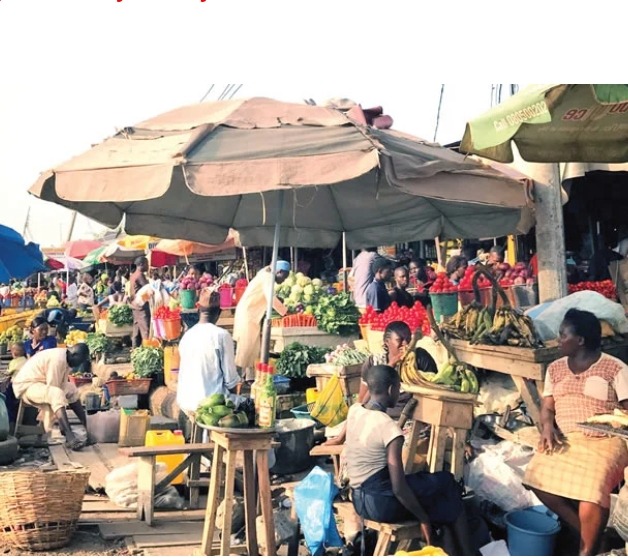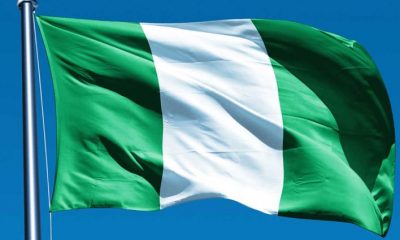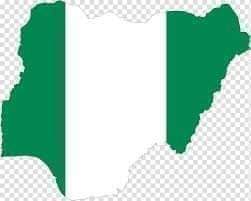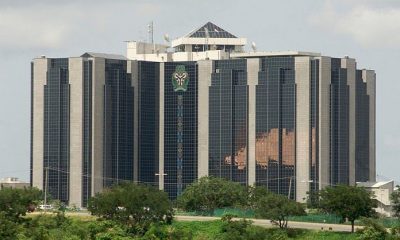Business
Nigerian Economy Shrinks By N63bn, 28 Sectors Struggle
Published
2 years agoon
By
Editor
Twenty-eight sectors of the economy declined in the second quarter of 2022 as real Gross Domestic Product shrunk by N63.49bn quarter-on-quarter.
While real GDP grew by 3.54 per cent year-on-year in Q2 2022, it declined by 0.37 per cent from the N17.35tn that was recorded in the first quarter of 2021 to N17.29tn in Q2, 2022, according to data from the National Bureau of Statistics, NBS.
The NBS blamed this decline on lower economic activity that was witnessed in Q1 2021. The analysis of real GDP data revealed that only 18 of the 46 NBS captured economic activity sectors experienced growth in the quarter under review.
READ ALSO: Nigerian Govt Plans N19.76trn Budget For 2023
According to the data from the statistics body, the agriculture sector witnessed mixed positives, with two sub-sectors witnessing growth and the other two recording a decline. Crop production grew from N3.39tn to N3.59tn; livestock declined from N318.49bn to N282.02bn; forestry grew from N44.14bn to N51.28bn; while fishing declined from N125.46bn to N88.3bn.
In the mining and quarrying sector, crude petroleum and natural gas declined from N1.15tn to N1.09tn; coal mining grew from N1.61bn to N4.79bn; metal ores declined from N4.87bn to N1.26bn; and quarrying other minerals grew from N363.29m to N25.51bn.
The 2022 has been a tough year for the manufacturing sector with inflation and foreign exchange scarcity negatively impacting growth. Only three of the 13 subsectors in the manufacturing sector recorded any growth in the quarter under review.
Oil refining grew from N1.66bn to N2.82bn; cement declined from N188.81bn to N143.74bn; food, beverage and tobacco declined from N875.94bn to N760.08bn; textile, apparel, and footwear declined from N342.48bn to N283.34bn; wood and wood products declined from N53.81bn to N44.41bn; whereas pulp, paper, and paper products declined from N13.38bn to N9.70bn.
Chemical and pharmaceutical products grew from N42.75bn to N47.37bn; non-metallic products declined from N63.52bn to N49.24bn; plastic and rubber products declined from N60.12bn to N53.01bn; electrical and electronics increased from N839.34m to N921.50m; basic metal, iron and steel declined from N39.93bn to N37.31bn; motor vehicles and assembly declined from N9.53bn to N7.63bn; and other manufacturing declined from N76.07bn to N55.55bn
The electricity, gas, steam and air conditioning supply sector grew from N32.72bn to N118.79bn. The water supply, sewerage, waste management and remediation sector grew from N39.06bn to N61.12bn. Construction declined from N725.99bn to N554.11bn. The trade sector grew from N2.79tn to N2.91tn.
Accommodation and food services also recorded a decline from N173.41bn to N68.17bn. Under the transportation and storage sector, road transport grew from N151.97bn to N293.85bn; rail transport and pipelines declined from N40.96m to 19.92m; water transport increased from N802.77m to N1.04bn; air transport declined from N25.26bn to N9.69bn; transport services grew from N7.11bn to N11.14bn; and post and courier services declined from N6.26bn to N2.42bn.
Seen as one of the bright spots of the economy, telecommunications and information services under the information and communication sector grew from N2.25tn to N2.59tn; publishing declined from N5.45bn to N4.66bn; motion pictures, sound recording and music production declined from N229.67bn to N157.57bn; and broadcasting grew from N330.47bn to N433.43bn.
The arts, entertainment and recreation sector declined from N35.69bn to N51.85bn. In the financial and insurance sector, the financial institutions subsector declined and insurance declined from N85.11bn to N80.18bn.
The real estate sector was one of the sectors that shrunk, declining from N927.32bn to N920.49bn. The professional, scientific and technical services sector fell from N560.47bn to N525.94bn; administrative and support services grew from N3.39bn to N3.54bn; public administration also grew from N283.59bn to N375.59bn, but education fell from N333.06bn to N231.85bn.
While the other services sector declined from N702.74bn to N473.72bn, the human health and social services sector increased from N126.01bn to N131.28bn.
According to Associate Professor of Economics at the Pan Atlantic University, Olalekan Aworinde, real GDP was the true reflection of the economic status of a country.
He said, “Nominal GDP is the market value of goods and services produced at a particular period. Real GDP is when you have the nominal GDP, and inflation factored in. It is the nominal GDP indexed with inflation.”
READ ALSO: Debt Servicing Gulps N13.17tn Under Buhari, Education Suffers
In a statement addressing the general GDP, the Founder /Chief Executive Officer, Centre for the Promotion of Private Enterprise, Dr Muda Yusuf, disclosed that productivity and competitiveness issues had continued to negatively impact performance across sectors of the economy.
He stated that the general operating environment of the nation was also very challenging for most investors, with SMEs particularly more vulnerable to prevailing macroeconomic shocks, resulting in high mortality rate for small businesses.
He said, “Many businesses are struggling to cope with the numerous challenges and shocks to the economy. On the welfare front, the citizens are also experiencing serious economic hardship as a result of the galloping inflation and the impact on purchasing power.”
PUNCH
You may like


Nigeria May Adopt Chinese Water Transport System


CNN Reporter Protests Nigeria’s $215 Single Entry Visa Fee


Nigeria Spends $4bn On Textile Products Imports Annually — Labour


Nigeria Economy Rakes In $1.5b Inflow In days


Nigeria Ranks World’s 102nd Happiest Nation, US, Germany Not Among 20 Top Counties


Nigeria Opens Land, Air Borders With Niger Republic

The Central Bank of Nigeria (CBN) started fresh and direct sales of US dollars at N1,021 per dollar to Bureau De Change operators.
Nigeria’s apex bank disclosed this in a circular signed by its Director of Trade and Exchange Department Hassan Mahmud.
“We write to inform you of the sale of $10,000 by the Central Bank of Nigeria (CBN) to BDCs at the rate of N1,021/$1. The BDCs are in turn to sell to eligible end users at a spread of NOT MORE THAN 1.5 percent above the purchase price,” the circular posted on its website read.
READ ALSO: Tinubu Unveils African Counter-Terrorism Summit
“ALL eligible BDCs are therefore directed to commence payment of the Naira deposit to the underlisted CBN Naira Deposit Account Numbers from today, Monday, April 22, 2024, and submit confirmation of payment, with other necessary documentations, for disbursement of FX at the respective CBN Branches.”
CBN’s move is coming as the naira is recording a slight depreciation against the dollar after weeks of gains.
In late March, the bank also sold $10,000 to each of the eligible Bureau De Change (BDC) operators in the country at the rate of N1,251/$1.
READ ALSO: Mixed Reactions Trail Video Of Couple’s Customised N200 Notes
Like in the most recent sales, it warned BDCs against breaching terms of the dollar sales, vowing to sanction defaulters “including outright suspension from further participation in the sale”.
The fortunes of the naira have fallen sharply since President Bola Tinubu took over in May. Inflation figures have reached new highs and the cost of living hitting the rooftops.
Nigeria’s currency slid to about N1,900/$ some months ago at the parallel market. But in recent weeks, it has gained against the dollar.
The Nigerian authorities have also doubled down on their crackdown against cryptocurrency platform Binance and illegal BDCs.
On March 1, the CBN revoked the licences of 4,173 BDCs over compliance failures.

Olusegun Alebiosu has been appointed as the Acting Managing Director/Chief Executive Officer of First Bank of Nigeria Limited (FirstBank Group), effective April 2024.
Alebiosu steps into this pivotal role from his previous position as the Executive Director, Chief Risk Officer, and Executive Compliance Officer, a position he held since January 2022.
Alebiosu brings to the helm of FirstBank over 28 years of extensive experience in the banking and financial services industry. His expertise spans various domains including credit risk management, financial planning and control, corporate and commercial banking, agriculture financing, oil and gas, transportation, and project financing.
READ ALSO: JUST IN: Access Holdings Names New Acting CEO
Having embarked on his professional journey in 1991 with Oceanic Bank Plc. (now EcoBank Plc.), Alebiosu has held several notable positions in esteemed financial institutions.
Prior to joining FirstBank in 2016, he served as Chief Risk Officer at Coronation Merchant Bank Limited, Chief Credit Risk Officer at the African Development Bank Group, and Group Head of Credit Policy & Deputy Chief Credit Risk Officer at United Bank for Africa Plc.
Alebiosu’s academic credentials further enrich his professional profile. He is an alumnus of the Harvard School of Government and holds a Bachelor’s degree in Industrial Relations and Personnel Management. Additionally, he obtained a Master’s degree in International Law and Diplomacy from the University of Lagos, as well as a Master’s degree in Development Studies from the London School of Economics and Political Science.
READ ALSO: Meet Newly Appointed Union Bank CEO
A distinguished member of various professional bodies, including the Institute of Chartered Accountants (FCA), Nigeria Institute of Management (ANIM), and Chartered Institute of Bankers of Nigeria (CIBN), Alebiosu is renowned for his commitment to excellence and ethical practices in the banking sector.
Beyond his professional endeavors, Alebiosu is known for his passion for golf and adventure. He is happily married and a proud parent.
With Alebiosu’s appointment, FirstBank of Nigeria Limited anticipates continued growth and innovation under his leadership, reinforcing its position as a leading financial institution in Nigeria and beyond.
Business
CBN Gives New Directive On Lending In Real Estate
Published
1 week agoon
April 17, 2024By
Editor
The Central Bank of Nigeria, CBN, has released a new regulatory directive to enhance lending to the real sector of the Nigerian economy.
The directive, issued on April 17, 2024, with reference number BSD/DIR/PUB/LAB/017/005 and signed by the Acting Director of Banking Supervision, Adetona Adedeji, signifies a notable shift in the bank’s policy towards a more contractionary approach.
In line with the new measures, the CBN has reduced the loan-to-deposit ratio by 15 percentage points, down to 50 per cent.
This move aligns with the CBN’s current monetary tightening policies and reflects the increase in the Cash Reserve ratio rate for banks.
READ ALSO: JUST IN: CBN Gov Sacks Eight Directors, 32 Others
The LDR is a metric used to evaluate a bank’s liquidity by comparing its total loans to its total deposits over the same period, expressed as a percentage.
An excessively high ratio may indicate insufficient liquidity to meet unexpected fund requirements.
All Deposit Money Banks are now mandated to adhere to this revised LDR.
The CBN has stated that average daily figures will be utilised to gauge compliance with this directive.
Furthermore, while DMBs are encouraged to maintain robust risk management practices in their lending activities, the CBN has committed to continuous monitoring of adherence and will adjust the LDR as necessary based on market developments.
READ ALSO: JUST IN: CBN Increases Interest Rate To 24.75%
Adedeji has called on all banks to acknowledge these modifications and adjust their operations accordingly. He emphasised that this regulatory adjustment is anticipated to significantly influence the banking sector and the wider Nigerian economy.
The circular read in part, “Following a shift in the Bank’s policy stance towards a more contractionary approach, it is crucial to revise the loan-to-deposit ratio policy to conform with the CBN’s ongoing monetary tightening.
“Consequently, the CBN has decided to decrease the LDR by 15 percentage points to 50 per cent, proportionate to the rise in the CRR rate for banks.
“All DMBs must maintain this level, and it is advised that average daily figures will still be applied for compliance assessment.
“While DMBs are urged to sustain strong risk management practices concerning their lending operations, the CBN will persist in monitoring compliance, reviewing market developments, and making necessary adjustments to the LDR. Please be guided accordingly.”

Kanye West To Launch Yeezy P0rn Studio With Stormy Daniels

Software Engineer Sentenced To Life In Prison For R*ping Neighbour’s Daughter

Many Ladies Can’t Cook, Christian Movie Producer, Bamiloye Laments Scarcity Of ‘Wife Materials’
Trending

 Entertainment2 days ago
Entertainment2 days agoBridesmaids’ Dance At Wedding Causes Stir On Social Media [VIDEO/PHOTOS]

 Politics4 days ago
Politics4 days agoEdo Guber: Akoko-Edo PDP Leaders Meet In Igara, Describe Ighodalo, Ogie As ‘Perfect Match’

 News5 days ago
News5 days agoFoundation Advocates Empowerment Of Women, Youth In Nigeria

 Metro2 days ago
Metro2 days agoVIDEO: ‘UNN Lecturer’ Caught Pants Down With Married Student

 News3 days ago
News3 days agoOutrage As Chinese Supermarket In Abuja Denies Nigerians Entry

 News5 days ago
News5 days agoWhy Police Detained Yahaya Bello’s ADC, Security Details Revelead

 News4 days ago
News4 days agoJapa: Types Of US Visa Available To Nigerians, Other Foreigners

 News3 days ago
News3 days agoIGP, Jonathan Disagree Over State Police

 News5 days ago
News5 days agoJUST IN: Ondo Poll: Violence Breaks Out At APC Primary In Okitipupa

 Entertainment2 days ago
Entertainment2 days ago“Got To f*** k The President’s Wife” – Kanye West Wishes Threesome With Michelle Obama[VIDEO]




































